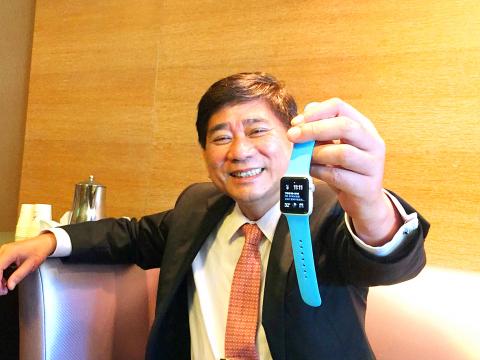Catcher Technologies Co (可成科技), which supplies metal casings for Apple Inc’s iPhones, yesterday revised upward its sales guidance for next quarter, citing increasing demand for smartphone and notebook products.
“Thanks to the smoother production and strong orders for metal casings for new projects, we now forecast the next quarter will be better than this quarter,” Catcher chairman Allen Hung (洪水樹) told a media briefing after the firm’s shareholders’ meeting in Tainan.
In an investors’ conference on April 29, Horng said the company’s revenue next quarter would be flat from this quarter due to the dissipating product cycle for existing projects.

Photo: CNA
In the first five months of this year, Catcher made NT$31.33 billion (US$1 billion) in sales, up 64.05 percent from a year earlier.
Hung said the strong sales performance bodes well for the company throughout this year.
Hung said sales this month would drop slightly from last month’s NT$6.85 billion due to a traditional slow season, but they would pick up significantly from next quarter.
“Sales in the fourth quarter of this year will expand further from the third quarter,” Catcher spokesman James Wu (巫俊毅) said.
Hung said the predicted momentum is based on larger order allocations from its major smartphone clients this year.
Commenting on one of its clients’ new smartphone projects, Hung said a surface treatment on a harder metallic material is more difficult than traditional metal-casing processes and would lower the yield rate at the beginning of the production cycle.
“However, it will not be a major issue for Catcher, as we keep improving our techniques,” Hung said.
Despite soft demand for PCs and weaker-than-expected smartphone sales, Hung said the firm does not worry about its business outlook, because Catcher’s main clients are doing well in the notebook computer and smartphone segments.
“Overall, our main clients are on the winning team,” he said.
In a bid to meet rising demand from clients, Catcher raised its capital expenditure by 35 percent from a year earlier to NT$6.76 billion in the first half of this year, Hung said, adding that the funds will be mainly be used to build new factories.
He said that capital expenditure for the second half of this year would be flat from the first half, mainly because of equipment purchases.
“Overall, capital expenditure for this year is to be lower than last year’s NT$23.2 billion,” he said.
Hung said he is upbeat about Catcher’s ability to outpace rivals for at least five years, adding that the firm’s advanced technologies and techniques in metal casing treatments for various products put it in a strong position.
Despite market concerns about rising competition from Casetek Holdings Ltd (鎧勝) and FIH Mobile Ltd (富智康) regarding orders of Apple MacBook and tablet products, Catcher remains confident about its technological edge.
“Tell me, which company should Catcher be worried about?” Hung asked shareholders.
Metal casing treatments are more delicate and complicated than people imagine, he said, adding that the work requires more than just advanced equipment.

Sweeping policy changes under US Secretary of Health and Human Services Robert F. Kennedy Jr are having a chilling effect on vaccine makers as anti-vaccine rhetoric has turned into concrete changes in inoculation schedules and recommendations, investors and executives said. The administration of US President Donald Trump has in the past year upended vaccine recommendations, with the country last month ending its longstanding guidance that all children receive inoculations against flu, hepatitis A and other diseases. The unprecedented changes have led to diminished vaccine usage, hurt the investment case for some biotechs, and created a drag that would likely dent revenues and

Global semiconductor stocks advanced yesterday, as comments by Nvidia Corp chief executive officer Jensen Huang (黃仁勳) at Davos, Switzerland, helped reinforce investor enthusiasm for artificial intelligence (AI). Samsung Electronics Co gained as much as 5 percent to an all-time high, helping drive South Korea’s benchmark KOSPI above 5,000 for the first time. That came after the Philadelphia Semiconductor Index rose more than 3 percent to a fresh record on Wednesday, with a boost from Nvidia. The gains came amid broad risk-on trade after US President Donald Trump withdrew his threat of tariffs on some European nations over backing for Greenland. Huang further

CULPRITS: Factors that affected the slip included falling global crude oil prices, wait-and-see consumer attitudes due to US tariffs and a different Lunar New Year holiday schedule Taiwan’s retail sales ended a nine-year growth streak last year, slipping 0.2 percent from a year earlier as uncertainty over US tariff policies affected demand for durable goods, data released on Friday by the Ministry of Economic Affairs showed. Last year’s retail sales totaled NT$4.84 trillion (US$153.27 billion), down about NT$9.5 billion, or 0.2 percent, from 2024. Despite the decline, the figure was still the second-highest annual sales total on record. Ministry statistics department deputy head Chen Yu-fang (陳玉芳) said sales of cars, motorcycles and related products, which accounted for 17.4 percent of total retail rales last year, fell NT$68.1 billion, or

HSBC Bank Taiwan Ltd (匯豐台灣商銀) and the Taiwan High Prosecutors Office recently signed a memorandum of understanding (MOU) to enhance cooperation on the suspicious transaction analysis mechanism. This landmark agreement makes HSBC the first foreign bank in Taiwan to establish such a partnership with the High Prosecutors Office, underscoring its commitment to active anti-fraud initiatives, financial inclusion, and the “Treating Customers Fairly” principle. Through this deep public-private collaboration, both parties aim to co-create a secure financial ecosystem via early warning detection and precise fraud prevention technologies. At the signing ceremony, HSBC Taiwan CEO and head of banking Adam Chen (陳志堅)